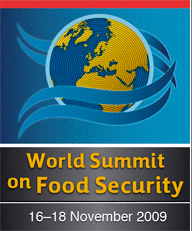Linked events
The outcomes of three related events taking place just ahead of the Summit contributed to the debate—a private-sector forum (Milan, 12–13 November), an inter-parliamentary meeting (Rome, 13 November) and a civil society forum (Rome, 14–16 November).
FAO says three events in October 2009 prepared the ground for the Summit. These were: a High-level Expert Forum on How to Feed to World in 2050, from 12–13 October; the Committee on World Food Security, from 14 to 17 October; and World Food Day on 16 October.
The launch of the 1 billion hungry campaign a week prior to the event.
FAO Director-General Jacques Diouf told a pre-Summit Private Sector Forum on 12 November that the importance of the private sector has increased due to privatization, globalization and the transformation of the food chain. [6]
On the eve of the summit, FAO Director-General began a 24-hour hunger strike to call for action to end the scourge of hunger and in solidarity with the one billion humans who suffer chronic malnutrition. [7] He called on "people of goodwill everywhere" to join him in a worldwide hunger strike this weekend. [8]
FAO on Monday 16 November 2009, said that agreeing a climate change deal in Copenhagen at the COP15 ( 7–18 December 2009) is crucial to fighting global hunger, which Brazil's president described as "the most devastating weapon of mass destruction." [9]

The Food and Agriculture Organization of the United Nations (FAO) is an international organization that leads international efforts to defeat hunger and improve nutrition and food security. Its Latin motto, fiat panis, translates to "let there be bread." It was founded on 16 October 1945.

The World Food Programme (WFP) is an international organization within the United Nations that provides food assistance worldwide. It is the world's largest humanitarian organization and the leading provider of school meals. Founded in 1961, WFP is headquartered in Rome and has offices in 80 countries. As of 2021, it supported over 128 million people across more than 120 countries and territories.

The Group of Eight (G8) was an inter-governmental political forum from 1997 until 2014. It had formed from incorporating Russia into the Group of Seven, or G7, and returned to its previous name after Russia was expelled in 2014.

In politics, humanitarian aid, and the social sciences, hunger is defined as a condition in which a person does not have the physical or financial capability to eat sufficient food to meet basic nutritional needs for a sustained period. In the field of hunger relief, the term hunger is used in a sense that goes beyond the common desire for food that all humans experience, also known as an appetite. The most extreme form of hunger, when malnutrition is widespread, and when people have started dying of starvation through lack of access to sufficient, nutritious food, leads to a declaration of famine.

Food security speaks to the availability of food in a country and the ability of individuals within that country (geography) to access, afford, and source adequate foodstuffs. According to the United Nations Committee on World Food Security, food security is defined as meaning that all people, at all times, have physical, social, and economic access to sufficient, safe, and nutritious food that meets their food preferences and dietary needs for an active and healthy life. The availability of food irrespective of class, gender or region is another element of food security. There is evidence of food security being a concern many thousands of years ago, with central authorities in ancient China and ancient Egypt being known to release food from storage in times of famine. At the 1974 World Food Conference, the term "food security" was defined with an emphasis on supply; food security is defined as the "availability at all times of adequate, nourishing, diverse, balanced and moderate world food supplies of basic foodstuffs to sustain a steady expansion of food consumption and to offset fluctuations in production and prices". Later definitions added demand and access issues to the definition. The first World Food Summit, held in 1996, stated that food security "exists when all people, at all times, have physical and economic access to sufficient, safe and nutritious food to meet their dietary needs and food preferences for an active and healthy life."
World Food Summits are convened by the Food and Agriculture Organization of the United Nations.

World Food Day is an international day celebrated every year worldwide on October 16 to commemorate the date of the founding of the United Nations Food and Agriculture Organization in 1945. The day is celebrated widely by many other organizations concerned with hunger and food security, including the World Food Programme, the World Health Organization and the International Fund for Agricultural Development. WFP received the Nobel Prize in Peace for 2020 for their efforts to combat hunger, contribute to peace in conflict areas, and for playing a leading role in stopping the use of hunger in the form of a weapon for war and conflict.

Josette Sheeran is an American non-profit executive and diplomat who served in the United States Department of State. Sheeran serves as the seventh president and CEO of Asia Society since June 10, 2013. Sheeran was also the United Nations's Special Envoy for Haiti.
The Global Forum on Agricultural Research and Innovation (GFAR) is an inclusive global forum, enabling all those concerned with the future of agriculture and its role in development around the world, to address key global needs. GFAR provides an open forum for stakeholders across the agricultural spectrum—ranging from researchers, organizations, and farmers—to participate in collaborative discussion and action around the current and future state of agriculture.
The International Assessment of Agricultural Knowledge, Science and Technology for Development (IAASTD) was a three-year international collaborative effort (2005–2007) initiated by the World Bank in 2002, which evaluated the relevance, quality and effectiveness of agricultural knowledge, science, and technology, and the effectiveness of public and private sector policies and institutional arrangements.
The term food system describes the interconnected systems and processes that influence nutrition, food, health, community development, and agriculture. A food system includes all processes and infrastructure involved in feeding a population: growing, harvesting, processing, packaging, transporting, marketing, consumption, distribution, and disposal of food and food-related items. It also includes the inputs needed and outputs generated at each of these steps. Food systems fall within agri-food systems, which encompass the entire range of actors and their interlinked value-adding activities in the primary production of food and non-food agricultural products, as well as in food storage, aggregation, post-harvest handling, transportation, processing, distribution, marketing, disposal, and consumption. A food system operates within and is influenced by social, political, economic, and environmental contexts. It also requires human resources that provide labor, research and education. Food systems are either conventional or alternative according to their model of food lifespan from origin to plate.
The 2010 IBSA summit took place in Brasilia, Brazil on April 15, 2010. The meeting took place between the three heads of government from the IBSA states. This was the fourth such meeting.

Food security is defined, according to the World Food Summit of 1996, as existing "when all people at all times have access to sufficient, safe, nutritious food to maintain a healthy and active life". This commonly refers to people having "physical and economic access" to food that meets both their nutritional needs and food preferences. Today, Ethiopia faces high levels of food insecurity, ranking as one of the hungriest countries in the world, with an estimated 5.2 million people needing food assistance in 2010. Ethiopia was ranked 92 in the world in Global Hunger Index 2020.

The International Day of Forests was established on the 21st day of March, by resolution of the United Nations General Assembly on November 28, 2013. Each year, various events celebrate and raise awareness of the importance of all types of forests, and trees outside forests, for the benefit of current and future generations. Countries are encouraged to undertake efforts to organize local, national, and international activities involving forests and trees, such as tree planting campaigns, on International Day of Forests. The Secretariat of the United Nations Forum on Forests, in collaboration with the Food and Agriculture Organization, facilitates the implementation of such events in collaboration with governments, the Collaborative Partnership on Forests, and international, regional and subregional organizations. International Day of Forests was observed for the first time on March 21, 2013.

There were 795 million undernourished people in the world in 2014, a decrease of 216 million since 1990, despite the fact that the world already produces enough food to feed everyone—7 billion people—and could feed more than that—12 billion people.
The Feed the Future Initiative (FTF) was launched in 2010 by the United States government and the Obama Administration to address global hunger and food insecurity. According to the National Institute of Food and Agriculture, it is "the U.S. government's global food security initiative."

Maria Helena Semedo is a Cape Verde economist and politician who currently serves as Deputy Director-General of the Food and Agriculture Organization.

Endorsed in December 2017, the United Nations Decade of Family Farming 2019-2028 seeks to place family farming at the center of national public policies and investments. In declaring this decade, the United Nations General Assembly recognized the importance of family farming in reducing poverty and improving global food security. The UN Decade of Family Farming is led by the Food and Agriculture Organization (FAO) and the International Fund for Agricultural Development (IFAD) in collaboration with governments and civil society organizations.

Sustainable Development Goal 2 aims to achieve "zero hunger". It is one of the 17 Sustainable Development Goals established by the United Nations in 2015. The official wording is: "End hunger, achieve food security and improved nutrition and promote sustainable agriculture". SDG 2 highlights the "complex inter-linkages between food security, nutrition, rural transformation and sustainable agriculture". According to the United Nations, there are around 690 million people who are hungry, which accounts for slightly less than 10 percent of the world population. One in every nine people goes to bed hungry each night, including 20 million people currently at risk of famine in South Sudan, Somalia, Yemen and Nigeria.

Global Goals Week is a shared commitment between a coalition of over 160 partners across all industries, which mobilizes annually in September to bring together communities, demand urgency, and supercharge solutions for the Sustainable Development Goals (SDGs). It was founded in 2016 by the United Nations Foundation, Project Everyone, and the United Nations Development Programme (UNDP). It is timed to coincide with the UN General Assembly "High-Level Week" in New York. The week includes events, summits, conferences, forums, workshops, pledges, and other activations in New York, around the world, and online. It usually runs alongside Climate Week NYC, the annual conference of Goalkeepers, Bloomberg Global Business Forum and many other high-level events.














